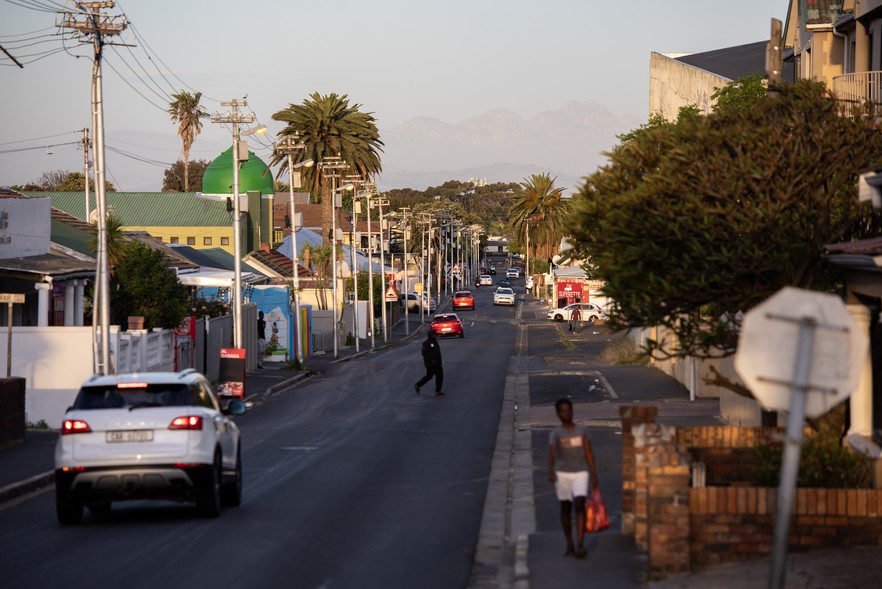
14 November 2025
A Monday afternoon in Park Road, Wittebome. Photos: David Harrison
Two religious landmarks, built a few hundred meters from one another, exemplify the diversity of Wittebome in Wynberg, Cape Town. The Darul Karer Mosque on Park Road, built in 1924, and the Corpus Christi Catholic Church, opened in 1937, welcome dozens of worshippers every week.
A young girl attends Friday prayers at the Darul Karar mosque in Park Road.
A father and son outside the Park Road mosque during Friday prayers.
Like many Catholic churches across the country, Corpus Christi was a site of multi-racial worship during apartheid. That heritage continues today. The pastor is of Indian descent, and the congregation consists of South Africans of varied backgrounds, as well as immigrants from other African countries. A member of the church told us how he grew up in the area, playing on the local sports fields with his Muslim peers.
Parishioners leaving the Corpus Christi Catholic church in Wittebome after Sunday Mass.
Sunday Mass at the Corpus Christi Catholic church in Wittebome.
Altar boys and girls enter the Corpus Christi Catholic church.
A large white rectangular building, once home to the Luxurama Theatre (commonly known as “The Lux”), is a reminder of the area’s multicultural heritage.
Built by the Quibell Brothers in 1963, the theatre exploited a loophole in apartheid legislation to welcome multiracial audiences to see singers and movies from around the world. The loophole was closed in 1967, after which the cinema mostly showed old Italian gladiator and Western films to the Indian and coloured community. (Wittebome was classified as a non-white area under apartheid’s Group Areas Act.)
The cinema is long gone. Today, the Lux houses the Kismet Supply Store’s building materials. The store operated next to the cinema, on the corner of Park and Batts Roads. It has been going for more than 80 years. It is a bustling spot, especially on a Friday afternoon during the mosque’s midday call to prayers.
A young boy sets out prayer mats outside the Park Road mosque in Wittebome ahead of Friday prayers. The building behind him used to be the Luxurama Theatre.
Members of Kismet Supply Store’s sales team. From left: Yusuf Busuman, Abduragman Kherekar (assistant manager), Hamzah Adam & Jafarle George.
Many of the shops in Wittebome have been run by immigrant families for generations. In recent years, new immigrant families from other African countries, as well as Pakistan and Bangladesh, have moved to the area and opened shops.
Naresh Kooverjee owns Babu’s Footwear, which was started by his grandfather, Nagar, an Indian immigrant and shoe maker who moved to Wynberg in 1921. Naresh’s father, Babu, took over the business in 1941. Naresh told us how his late father once fixed Welsh singer Tom Jones’ white platform boots. Jones was scheduled to perform at the Lux.
Naresh Kooverjee stands in front of Babu’s Footwear, the shop opened by his grandfather in 1921.
Kooverjee, in a back store-room at Babu’s Footwear, shows the original delivery bicycle used by his grandfather to drop off shoes in the 1920s. Naresh has kept many of his grandfather’s belongings, including a leather tool bag he made for his tools, old account books and a small copper Hindu temple used by the family for prayers and offerings.
Faiz Rasool, from Pakistan, has been working at a barber shop in Park Road for over fifteen years. He lives in South Africa alone and has only been able to return home to his home in Lahore every five years to visit his family for a few months.
Faiz Rasool at the Abid Barber shop in Park Road, where he has worked for over 15 years.
Abdul Rahman, originally from Pakistan, finishes off a client’s haircut at the Abid Barber shop in Park Road.
Children feel safe to play a game of street cricket in the late afternoon.
A busy Friday afternoon in Wittebome outside the Darul Karar mosque in Park Road.
Workers at the end of a long day wait for the southbound train at the Wittebome station platform. The railway line separates Wittebome from Wynberg Main Road and the areas classified as white and non-white during apartheid.